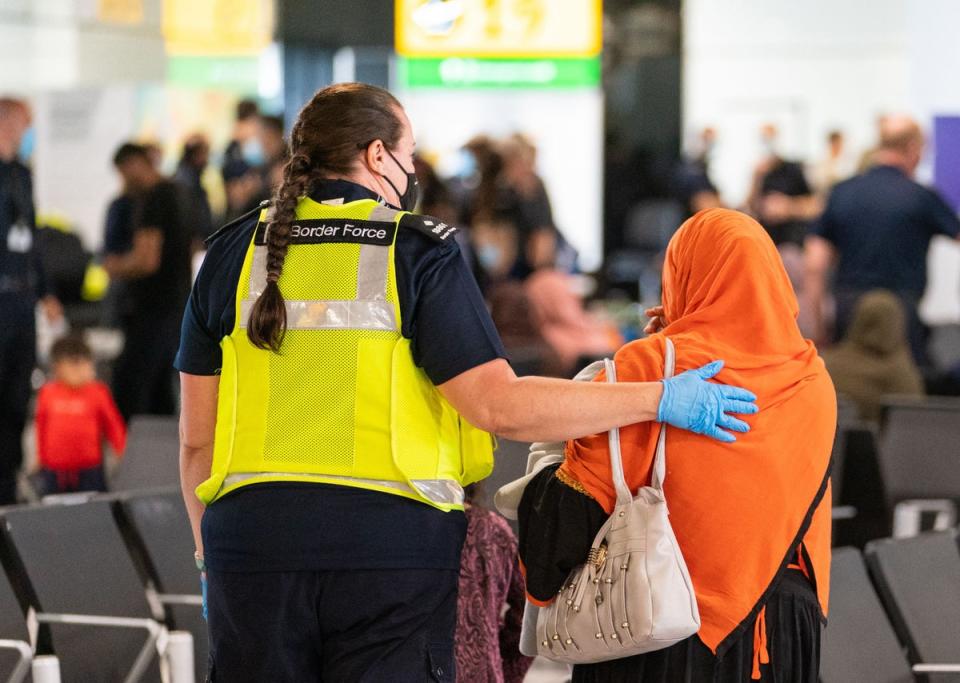Hundreds of Afghans who applied for sanctuary in the UK forced to wait years for a decision
More than 200 Afghans who applied for sanctuary in the UK have been waiting two years for a decision from British authorities, The Independent can reveal.
The Afghans, who applied for help based on their claims they helped the British armed forces, have been left “in limbo”, with many living in fear for their lives, campaigners said.
Armed forces minister James Heappey confirmed 2,125 people were still waiting on a decision as of Tuesday, with 10 per cent of these waiting for two years.
The numbers waiting on a decision are up from 2,026 applications in September 2023, despite the Ministry of Defence pledging to cut the backlog to zero by the end of summer.
Ministers have faced criticism over their handling of applications to the Afghan Relocations and Assistance Policy (Arap) scheme, designed for those who worked alongside the British forces in Afghanistan.

In a joint investigation with Lighthouse Reports and Sky News, The Independent revealed that the cases of Afghan special forces who were paid and trained by the UK government had been wrongly rejected for help.
The government has now committed to reassessing some 2,000 applications from those with credible links to Afghan specialist units.
Afghans who had confirmed links to the British armed forces were also abandoned in hotels in Pakistan for months on end after Rishi Sunak decided to limit the use of hotels in the UK.
Those waiting for a decision in Afghanistan will face a further wait for relocation even if they are found eligible, with restarted MoD flights now transferring people from Pakistan to the UK.
Of the 2,125 Afghans who are still waiting on a resettlement decision, 207 have been waiting two years, 333 for a year and 268 have been waiting for 18 months, government figures show. 750 of the cases are new, while the rest are complex, the MoD said.
Labour’s shadow armed forces minister Luke Pollard said that the government’s treatment of Afghans “has been a shameful saga of failure”. He added: “Ministers have failed to deal with the backlog of Arap applications, left Afghans who served alongside our forces in limbo and thousands are still waiting for decisions on their eligibility to relocate to the UK.”
Sarah Fenby-Dixon, Afghanistan consultant at the Refugee Aid Network, said that the fact more than 2,000 people were still waiting on an Arap decision “is evidence that the government has failed to understand the gravity of the situation for those Afghans left behind and at risk”.
She added: “Many of these people face serious and immediate threats because of their previous work with HM government. Just today, it is reported that the Taliban are again carrying out house-to-house searches in Kabul and many Arap applicants face torture and death if they are found.”
She called on the government to get the backlog cleared “as quickly as possible”.
One Afghan former intelligence analyst, who provided letters of support from his RAF colleagues, has been waiting on his Arap decision for over two years. He fled to the UK on a small boat, is now living in a Home Office hotel, and has been threatened with removal to Rwanda.
He said he had written numerous times to the MoD’s resettlement scheme pleading with them to assess his case. He added: “What the MoD is currently doing is complete betrayal and unfairness. I’ve written to them ten times but I get no response at all. It seems like they have completely closed Arap and left everyone out.”
An MoD spokesperson said: “We are honouring our commitment to those brave Afghans who supported the UK mission in Afghanistan, and those granted settled status.
“We continue to process every Arap application at pace and the vast majority have been processed. The small number remaining are mainly a mixture of new cases or very complex cases.
“So far, we have brought around 24,600 people to safety from Afghanistan, including over 15,600 people from the Arap scheme, which is one of the most generous of any country, and thousands of Afghans are eligible for our resettlement schemes.”

 Yahoo Lifestyle
Yahoo Lifestyle 
